Celebrating Dads who Do Baby-Led Weaning
- How these dads learned to love baby-led weaning even though it freaked them out at first
- Which foods are actually easier to get the dads to offer for the first time vs. moms
- What a pediatrician dad and a deployed dad did to come around on baby-led weaning
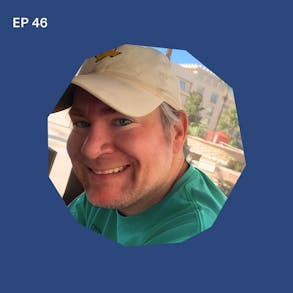
LISTEN TO THIS EPISODE
Episode Description
Let’s shine the spotlight on dads who are diving headfirst into baby-led weaning. From pediatricians and military dads to first-timers and seasoned pros, these proud fathers share what they love most about watching their babies explore real foods. Whether your partner’s already on board or needs a little nudge, these dad stories are sure to inspire.

Links from this Episode
- Baby-Led Weaning with Katie Ferraro program with the 100 First Foods™ Daily Meal Plan, join here: https://babyledweaning.co/program
- Baby-Led Weaning for Beginners free online workshop with 100 First Foods™ list to all attendees, register here: https://babyledweaning.co/baby-led-weaning-for-beginners
Other Episodes Related to this Topic

Latest Episodes
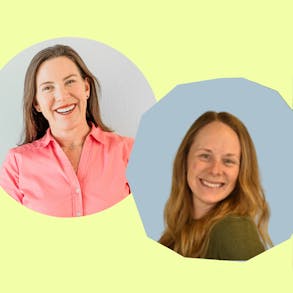
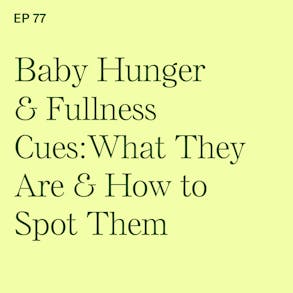
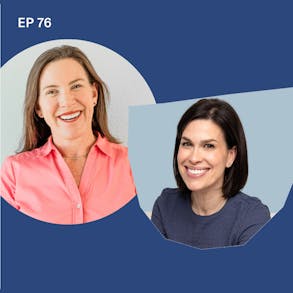
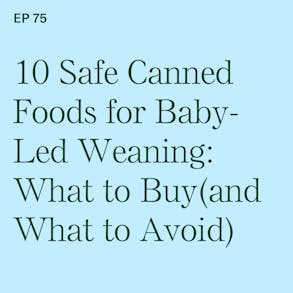
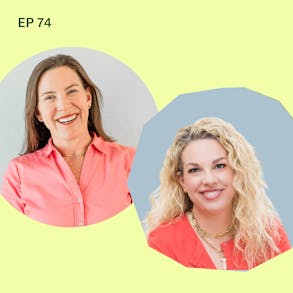
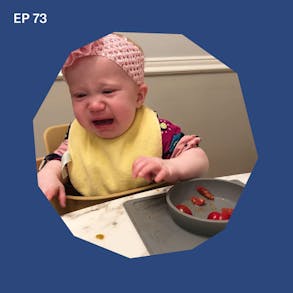
Skylight Frames (0s):
I will be the first to admit that I was definitely late to the shared family calendar game for years. I would just keep stuff on the calendar in my phone or the sticky notes or my brain. My husband was on a need to know basis. Then I would get frustrated with him when he couldn't read my mind about all the stuff we needed to work on together to get seven kids. So there are sports and their activities and just get through the day. That all changed when I got a skylight calendar earlier this year for Mother's Day. So I'd heard of the skylight, but at first I was like, oh, that's not for me. Like we're not a big technology family. My kids do not have tablets or watches. They do not have any way to check the calendar. Then I started realizing how much they were asking me if they could see my phone. Can I see your phone? I wanna see what time my soccer practice is. I have one son, can I see your phone? I need to see what time the Padres play every day when we got the skylight calendar, you guys total game changer. It's this beautiful 15 inch display. I put it right on the counter in the kitchen so it's right at the kids' eye level, they can reach it. I put the family calendar that was previously only on my phone on the skylight. I color coded every kid. I even sat down recently and manually inputted our paper chore chart. So now every kid checks their chores for the day. They do it, they check it off, they get a star for every tour they do. After a certain number of stars, I've got like a whole reward system set up. The skylight calendar is amazing, it's wifi connected. It syncs seamlessly with your calendar. There are tons of customizable views for daily, weekly, or monthly planning. You can even put in meals, which I recently started doing So that A, I would actually stay like on a meal plan during the summer when we're kind of off of our schedule and B, everybody would stop asking me what's for dinner. Right now Skylight is offering our listeners $30 off their 15 inch calendar if you wanna check it out and organize your family life for yourself. I swear this will change your life too if you go to skylight cal.com/weaning. So again, go to skylight cal.com/weaning to get $30 off your 15 inch calendar. That's S-K-Y-L-I-G-H-T-C-A l.com/weaning and get your calendar game on point now because I know that your brain is also approaching max capacity with that baby and Skylights calendar is pure heaven for connecting your digital and your non-digital world together.
Adrian J (2m 11s):
He's seven months old and he's doing great. One of my favorite things to see is him being able to grab the spoon and pretty much feed himself out of his little bowl and and spoon that we got for him.
Katie Ferraro (2m 24s):
Hey there, I'm Katie Ferraro, registered dietitian, college nutrition professor and mom of seven specializing in Baby-Led Weaning here on the Baby-Led Weaning with Katie Ferraro podcast. I help you strip out all of the noise and nonsense about feeding, giving you the confidence and knowledge You need to give your baby a safe start to solid foods using Baby-Led Weaning. Today we are celebrating a very unique group of people who support Baby-Led Weaning and that are the dads who do Baby-Led Weaning. Now moms don't roll your eyes. I know that most of you are the primary feeders and you guys are the ones doing a lot of the work, getting these babies to the table and learning how to safely eat.
Katie Ferraro (3m 9s):
But there are a heck of a lot of dads out there who are also rolling their sleeves up and getting involved in Baby-Led Weaning or at least eventually becoming converts to this approach to starting solid foods because a lot of the moms talk them into it. So I put out a call to all of the Baby-Led Weaning dads on Instagram asking them to leave me an audio message sharing their absolute favorite part of Baby-Led Weaning. This one was tough because I didn't want the episode to go on and on and on, but we picked nine of our favorite entries to include in this episode. So I think you guys are going to love these dad's take on all these babies coming to the table and learning how to feed food to themselves.
Katie Ferraro (3m 49s):
If you are a dad and this is your first Father's Day, happy Father's Day to you and thank you to all of the parents out there who are working hard to support your baby's ability to feed themselves. But today we're gonna shine a spotlight and celebrate the dads who do Baby-Led Weaning. Alright, coming out of the gate strong with Connor Johnson. He is a pediatrician and a dad. I'm gonna let him speak for himself here, but I do just need to preface this by saying I love when pediatricians get on board with Baby-Led Weaning, but only because of their own babies. Like I picture like them being in the office and other parents are asking about Baby-Led Weaning and they're like, yeah, yeah, whatever, whatever. And then they discover for their own babies and they're like, oh my gosh, this is amazing. With no further ado, here's Connor.
Connor Johnson (4m 31s):
My name's Connor Johnson. I'm a father, husband and pediatrician and this is kind of my experience with Baby-Led Weaning as a father. It's been just really great to see my eight month old son, like his personality, come out with the foods that he tries and interacts with us at mealtime. It's fun to see every night how it changes and as a parent, you know, we look forward to eating dinner meals with our son, trying new foods, researching ways to prepare these items and actually watch how he eats 'em. It's just really exciting. Each evening he continues to surprise us with what he enjoys and some of his favorite items and how some of those items aren't our favorites and you know, some foods that we don't like, he just loves and the ones that we enjoy he's not so sure about.
Connor Johnson (5m 11s):
Really, as a pediatrician, it's great to find this structured program that helps develop, you know, fine motor skills, how he can grasp hold and swallow meals on his own. And even at six months he's worked with holding a spoon and how that's kind of evolved with his coordination eating larger food items has been really encouraging all of his teeth coming in and how he learns to utilize chewing and going through a safe slow paced manner. Going through the baby-led reading process personally has helped me as a medical provider recommend the structured program where infants can, you know, experience a variety flavors and textures which they can eat in a safe organic manner. So that's my experience with baby and I encourage it to other parents who are thinking about it as well.
Katie Ferraro (5m 53s):
Oh, I love that. And I am personally a huge sucker for the parents who just lean into their baby eating foods that they don't even love. Next up, I've got another new dad. This is Nick Brooks and the Debbie dietitian in me feels obligated to preface this with, please remember that raw or undercooked shellfish can be a foodborne illness risk. But check this out, here's Nick.
Nick Brooks (6m 12s):
I have an 11 month old daughter and my best Baby-Led Weaning win was getting her to eat a raw oyster at brunch a couple days ago and I just love that I can share my love of cooking and eating with her. She eats pretty much everything. She's not sure about stinky cheeses, but she'll at least try
Katie Ferraro (6m 33s):
'em. Awesome. Alright, guilty pleasure, but I love you guys when before you have kids, you only know like a few other kids and they're usually the kids of your siblings or your siblings in-law, those kids and then those kids don't even eat any foods. And then you have a baby and you do Baby-Led Weaning and you're like, whoa, my kid eats, this is cool. Check out this Baby-Led Weaning dad, this is Adam Cheson. I love his story.
Adam Cheson (6m 57s):
It was Passover a few months ago. Our baby boy was seven months old. We have a niece and a nephew who hardly eat anything and they ate maybe a matza ball from the Matza ball soup. Our seven month old baby boy ate everything that was served. Brisket, potatoes, matza balls, broccoli, anything, it doesn't matter.
Katie Ferraro (7m 20s):
Next up is Adrian J I've gotta give a shout out, a super soft spot in my heart for a husband of a fellow dietitian. I actually made my husband do this episode with me last year, so he's very happy to pass the torch on to you Adrian. Jay, take it away.
Adrian J (7m 36s):
Hey there, first time BLW Dad, our second child, the first child we spoonfed when she was a baby and this time my wife's a registered dietitian, learned about BLW And she asked me my opinion and honestly I was worried, you know, our baby's gonna choke and you know, I was just worried for him and we've gone through a little over 35 foods, he's seven months old and he's doing great. One of the best things, or one of my favorite things to see is him being able to grab the spoon and pretty much feed himself out of his little bowl and and spoon that we got for him.
Adrian J (8m 17s):
It was really great to see no choking instances throughout this entire time and you know, I, we look forward to continue the rest of his first year trying to reach that a hundred foods. So any other dads are on the fence, I suggest just go for it and you know, this is a great, a great program. Thank you. Happy Father's Day.
Katie Ferraro (8m 37s):
So good. Okay, kids menu. Question for you. Do you guys have those friends or maybe it's you or your significant other, but they're an adult who has the palate of a 5-year-old, like they eat chicken nuggets and quesadillas and white pasta all day every day? Well, one of the Benefits of Baby-Led Weaning and trying a new food every day is that you get to help push your baby's palate. Check out Jeff Bayer's take on Baby-Led Weaning and how it's helping their family.
Jeff Bayer (8m 60s):
We did Baby-Led Weaning for our first daughter. We have two daughters now she's, she's now two years old and my favorite part of Baby-Led Weaning is the advanced palate of my toddler. She likes all foods just about, there's very few foods that she won't try. Very few flavors that she doesn't at least, at least attempt. One of her favorite foods is weird as ZZ is avocado, I can cut up an avocado in the morning or for lunch and I can just give her that and she'll happily eat that. She likes hummus. I feel like the more kind of seasoning and garlic the better for her. I see, you know, other parents with kids with picky eaters and I just, I imagine that is such a challenge.
Jeff Bayer (9m 44s):
But what Baby-Led Weaning has has done for our daughter is just give her the courage to try lots of things and just give her so many options when it comes to mealtimes. So that's my take on Baby-Led Weaning.
Sierra (9m 57s):
Hey, we're gonna take a quick break, but I'll be right back At Sierra Discover top workout gear at incredible prices, which might lead to another discovery. Your headphones haven't been connected this whole time. Awkward discover top brands at unexpectedly low prices. Sierra, let's get moving.
Katie Ferraro (10m 24s):
You guys also love how Jeff was like, whoa, my baby likes avocado. It's so cool. And mom's everywhere like, yeah, of course avocado's like the best beginning Baby-Led Weaning food, but who cares? Whatever gets the dads on board, I am here for it. Thank you so much for sharing, Jeff. Next up is Robert Carton and I am so digging this dad because he is leaning into the mess and not letting it stress them out. Check it out. Here is Robert.
Robert Carton (10m 49s):
There's nothing cooler or funnier than seeing your daughter try new foods, whether it's putting her hands in mashed potatoes and just smothering it all over her face, trying to learn how to eat it or just simply eating new things like hamburger grilled cheese. It's just a fun time. Makes meals fun and it keeps life simple. You don't have to cook yourself food and then prepare your daughter or sound food. It's all one food for the family. Keeps life nice and simple.
Katie Ferraro (11m 20s):
Oh, we had so many cool entries for this episode. I'm so sorry we couldn't include every dad had quite a few active duty military dads and I wanna say thank you to all of you for your service. Next up is Peter Cortez and he is taking care of business overseas, but he still took the time to weigh in about Baby-Led Weaning.
Peter Cortez (11m 39s):
Hello, my name is Peter, my wife is Lauren and our son is Logan. Logan is 10 months and he's been doing Baby-Led Weaning for quite a while now. You know, I couldn't be more proud of him for all of his progress that he's accomplished, you know, in the couple months that he's been doing Baby-Led Weaning. Currently I'm in the National Guard deployed overseas, so I have not had the opportunity to experience this journey with them in person. When Lauren had first approached me with this idea Baby-Led Weaning, I was very standoffish. I'm a firefighter EMT on the civilian side. So naturally, you know, pediatric emergencies were a big worry to me, you know about especially his little airway.
Peter Cortez (12m 22s):
But as time progressed, you know, Lauren is a speech therapist, So she kind of had an idea and knew what she was doing and you know, she really opened my eyes and showed me that, you know, this Baby-Led Weaning is, it's a very intricate but very helpful system for you know, babies to get through. Especially Logan. You know, seeing him eat chew food and literally seeing the food go right through him is just amazing little experience, especially when she shows me his dirty diapers and you can see those blueberries or peas or green beans, you know, lying in that poop, you know, you know he's eating pretty well. Thank you.
Katie Ferraro (12m 58s):
Thanks again, Peter. Can't wait till you're home. Getting to do all that baby-led weaning meal prep for your lovely SLP wife. Give the lady a break. So cool. All right, next up is Michael Owen. He's in the UK, but no matter where you are in the world, one of the biggest Benefits of Baby-Led Weaning across all food cultures is that you don't have to short order cook for your baby. Take it away Michael.
Michael Owen (13m 20s):
I'm a first time dad and I'm enjoying Baby-Led Weaning with my daughter who's now 10 months. My favorite thing about Baby-Led Weaning is the fact that we can all enjoy the same meals together as a family. I definitely recommend other parents to try the Baby-Led Weaning approach with their little ones.
Katie Ferraro (13m 36s):
Thanks Michael. I know we all get in food ruts, but Baby-Led Weaning is a chance to really branch out and actually push your baby's palate beyond those simple starter foods, but you sometimes find out there's foods you like as well. So our last ad today on the podcast is Sean Cheney and he totally gets that whole thing about trying some new foods. He's actually gonna be hyping some of his favorite Benefits of Baby-Led Weaning.
Sean Cheney (13m 59s):
So I've got a two and a half year old and an almost 1-year-old. So I've done Baby-Led Weaning twice now. And what I love about it is it exposes them early on to a ton of different foods, which hopefully means that they will not be a picky eater or as picky of an eater because they've had that exposure early on. And it's enjoyable as a parent Because you get to witness their expressions as they eat new foods. Some of them are hits, some of them are misses, and some of them are just downright funny, like giving your son a lime wedge and to see his face pucker up.
Sean Cheney (14m 42s):
It's just fun. But it challenges me as a parent to make sure that they are a well-rounded eater and you know, with those lists of foods to follow it, it gets you out of the routine because sometimes as parents we like to to make the same things and so our kids would get comfortable with that. So it challenges us to have to help them have a varied diet.
Katie Ferraro (15m 9s):
That was so fun. Thank you to all of the dads who submitted an audio message. I'm gonna put a little bit more of our tribute to Baby-Led Weaning Dads up on the show notes page for this episode, which you can find@blwpodcast.com/46. And if you're just getting started and you're a dad who's like, wait, I wanna learn more about Baby-Led Weaning or if you're a mom or a caregiver or a grandparent, the best place for anyone to start is my free online workshop. It's called Baby-Led Weaning For Beginners. This is a free online one hour video workshop where I show you all the ins and outs of what to do and what not to do. I give everybody on that free workshop a copy of my original 100 First Foods list. You can take the training right now, later today, tomorrow when your baby naps, whatever is convenient for you.
Katie Ferraro (15m 51s):
Get signed up and register for the Baby-Led Weaning For Beginners workshop at Baby-Led Weaning.co/workshop. And if you've already got the a 100 First Foods list and now you're ready to dive in and learn how to make all of those foods safe for your baby and what age and stage they should be eating at and what sequence to feed the allergenic foods and etc. Check out my full comprehensive program called Baby-Led Weaning with Katie Ferraro. I have a 100 First Foods content library in there with all the videos and recipes and instructions on how to make all the foods safe. Plus my 100 First Food Daily Meal Plan, which is 20 weeks of done for you meal plans. That's all linked up in the registered dietitian page for the program. Again, the program is Baby-Led Weaning with Katie Ferraro and you can get signed up at Baby-Led Weaning.co/program.
Katie Ferraro (16m 36s):
Special thank you to our partners at AirWave Media. If you like podcasts that feature food and science and using your brain, check out some of the podcasts from AirWave or online@blwpodcast.com. Thanks so much for listening and I'll see you next time.
Those Who Can't Teach Anymore (16m 59s):
Welcome to those who Can't teach anymore, a narrative podcast series that explores why teachers are leaving education and what can be done to stop the Exodus. This season, we're getting a look at the year and the life of teachers from across the country through their audio journals. I'm Darcy Oster Miller. This is Megan Algos. This is Sophie V, this is Charlie Black. This Taylor Bears is I Redman. David Whisker, Dan Morris, this is Amanda Smith. Look for those who can't teach anymore. Season two, a different kind of the same thing.

The Program Baby-Led Weaning with Katie Ferraro
A step-by-step digital program for starting solid foods safely and navigating the original 100 FIRST FOODS™ meal plan with baby-led weaning.
 EXPERT-LED, PROVEN APPROACH TO EATING REAL FOOD
EXPERT-LED, PROVEN APPROACH TO EATING REAL FOOD CONCISE VIDEO TRAININGS TO MASTER BABY-LED WEANING
CONCISE VIDEO TRAININGS TO MASTER BABY-LED WEANING 100 FIRST FOODS DAILY MEAL PLAN WITH FOOD PREP VIDEOS
100 FIRST FOODS DAILY MEAL PLAN WITH FOOD PREP VIDEOS
Baby-Led Weaning for Beginners Free Workshop
Is your baby ready to start solid foods, but you’re not sure where to start? Get ready to give your baby a solid foundation to a lifetime of loving real food…even if you’re feeling overwhelmed or confused about this next stage of infant feeding.
Get baby-led weaning recipes and tips delivered to your email inbox.

